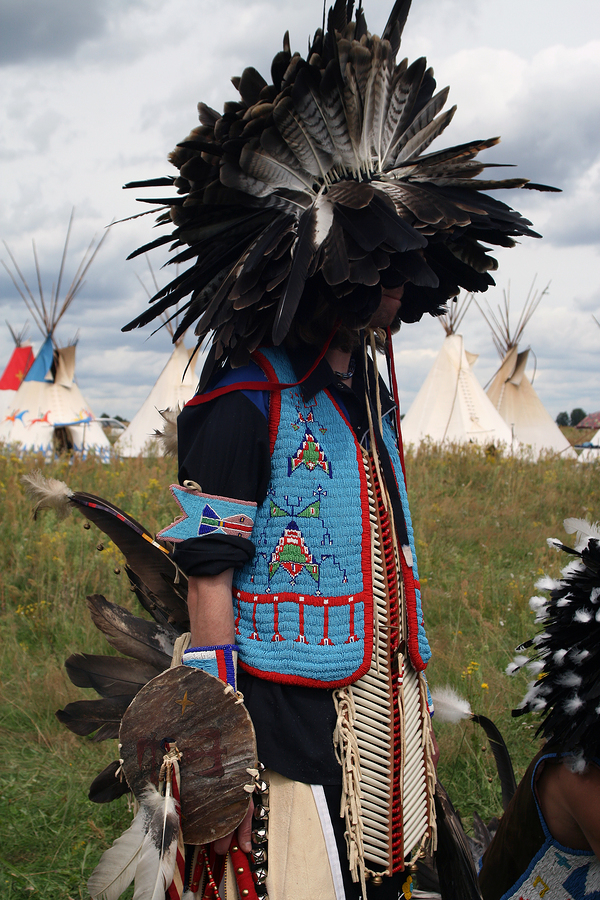
Well, hello!You’re back! That must mean you’re interested in my theories about the save-the-world Team. Whether you’re right on my wavelength, or merely fascinated by what you see as the deterioration of my sanity, I’m so pleased you’re here.
You may recall that in my last post, I hypothesized there are certain people who are born with the natural tendencies of shamans, and who feel somewhat lost and misplaced in modern society. Furthermore, these shaman-types (whom I call the Team) are feeling more and more compelled to facilitate a transformation in the way humans think and live, since without some such transformation, humans will continue to destroy the planet’s ecosystems until we’re all crispy little bits of toast. The way for Team members to be happy, I claimed, is to live in whatever way feels most joyful, since shaman-types are finely tuned to be miserable when we’re not fulfilling our life missions.
In this post I want to elaborate on what I think Team members will end up doing as we live more and more joyfully. It’s all very well to say “Follow your bliss, child!” But how does that translate into pragmatic action? How do we pay the mortgage, especially in these officially Troubled Times? How should we actually make our way in the world, let alone change it, with whatever tiny personal influence we possess?
I’ve spent my whole career helping individuals answer these questions. What I’ve found is that for Team members to live optimally, we must do three things, to wit:
- Internally (that is, in terms of our energy, thinking, and world view) we must be perpetually creative, receptive, and communicative, so that new ways of living can be expressed through our ordinary, everyday existence.
- Socially (in interpersonal interactions and any life situation that involves social structures of any kind) we must be leaders. Part of the obligation inherent in charting new territory is being willing—and able—to lead.
- Economically, Team members typically end up being paid to do steps 1 and 2. Shamans are always – brace yourselves for this one – entrepreneurs. The word “entrepreneur” comes from the French entre and prendre, and means “one who takes into .” Leading your own life by thinking and behaving in total harmony with your inner nature is your full-time job. People will pay you to do it, though how you deliver it will be unique. However this happens, I doubt you can fit it in around a 40-hour week doing something you loathe.
My self-help work to this point has been about individual life strategies: “Finding Your Own North Star,” “Steering By Starlight,” and so on. In this and future blog posts, I’ll be covering points 2 and 3: how to lead your life, rather than following exiting patterns in any situation; and how to make a living taking (prendre) a new way of thinking into (entre) the world.So today’s topic, Team mates, is Leadership 101.
You Have to Become a Leader in a Flat World

Leadership has become a hot topic in business and economics these days, because as the 21st century gets well under way, new social forms are emerging from the proliferation of unprecedented communication technologies.
If you’ve read Thomas Freidman’s Pulitzer-Prize winning economic analysis The World Is Flat, you know that computer technology, particularly the Internet, has created a “level playing field” beyond anything previous generations could imagine. A genius who happens to be born in a small village in Malawi or Bangladesh has a pretty good chance at somehow getting access to a Web-enabled computer, which means that instead of living and dying as a really smart villager, that genius has access to virtually all human knowledge. He or she can access the Human Genome Project just like, say, the Queen of England.

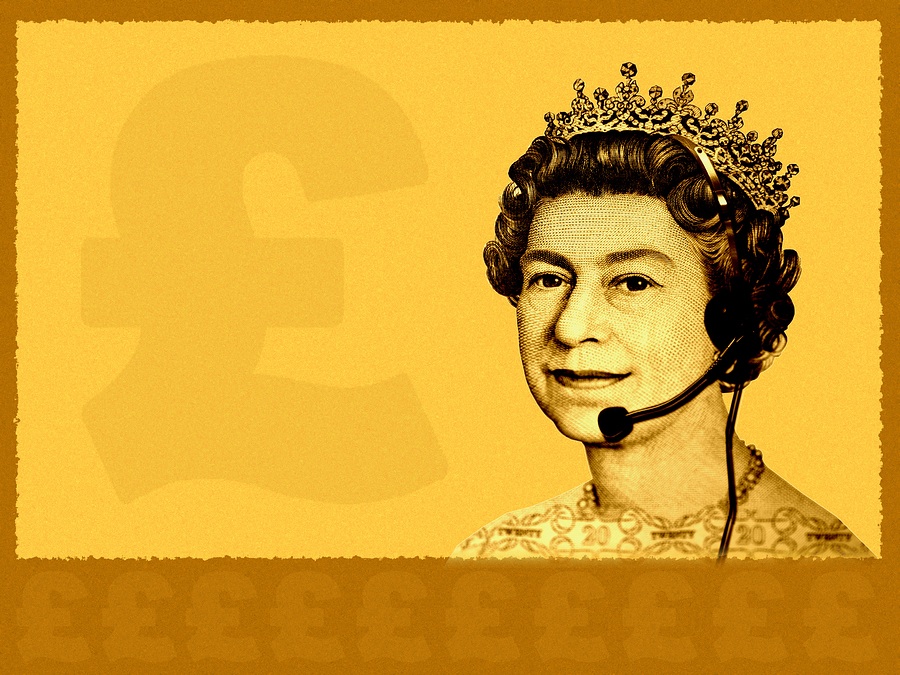
The same technological surge has “de-geographized” the earth’s human groups: that same wired-up Mawali villager not only has access to knowledge, but to the company of like-minded people everywhere in the world. That’s why, according to business guru Seth Godin, social analyst Malcolm Gladwell, and utopian theorist Daniel Quinn (among others) today’s most influential human groups are forming in cyber-space, among interested groups of equals.People were once limited to knowing the few people they might meet in a world where the fastest form of transportation and long-distance communication was the sailboat.
In Godin’s book Tribes:We Need You to Lead Us, the author points out the key role leadership plays in this new socioeconomic environment. The way to make money, Godin says, is to connect with one’s “tribe” through all available forms of communication, and step into the role of leader—the one providing new ideas and information to unite, entertain, comfort, guide, and inspire the tribe.
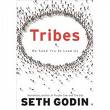


Exhibits A and B: Yours Truly, and You
As you’ve no doubt noticed, this blog post is part of the very social transformation it’s describing. Here we are, you and me and the rest of the Team, visiting my particular cyber-village (website). We’re here to discuss our common desire to find our right lives, to meet one another, to help heal the earth and its people.And, to my own astonishment, I am…uhm…yes, I suppose so…I am the leader of this particular conversation.
Now, the very last thing I ever thought I’d do is lead for a living.Quite the contrary: I had a difficult start in life (though not nearly as difficult as many people’s), then had to cope with chronic disabling disease, a rough departure from my childhood religious community, as well as having a child who was prenatally diagnosed with Down syndrome.I thought I’d figure out how to cope with all that, and then get a job.
The only problem—if you can call it that—was that the more I figured out how to be happy, the more people kept paying me just to talk about that. Just wrestling my way through a classic set of shaman-struggles led me to my “tribe,” and became my career.
My professional story adheres to the pattern of new social organizations chronicled by Friedman, Gladwell, Godin, and their peers. My “company” isn’t a pyramid structure, with me at the top, middle managers glued to their offices, and a spreading base of low-paid cubicle dwellers cranking out more product under my lash. This is how a classic corporation or government looks:
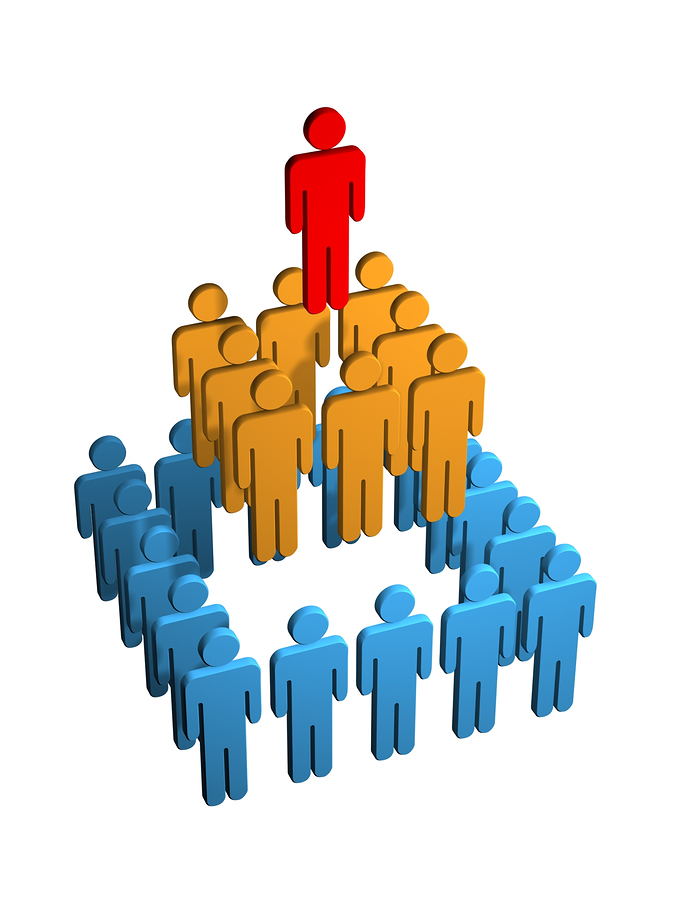
This is not the business model that will probably suit you best. Though I train and work with other coaches, I consider them (you?) my professional equals, leaders of their own “tribes.” We aren’t a corporate pyramid, but a loose confederation of entrepreneurs, overlapping circular groups who can optimize each other’s value by working together in a variety of ways. This is how our business model looks (especially after you’ve eaten your special mushrooms):

This means that none of us has to remain in the childish role of employee. We don’t have to answer to the huge, stable corporate Mommy And Daddy, who pay us an allowance for doing the chores they demand. Instead, we’re all free thinkers.Instead of looking to etiquette books, the nearest religion, or corporate policy for instructions on how to live, we guide our social and professional actions by asking and answering a two-part question:“Who are my people and how can I serve them?”
This question is itself the path to the answer a Team member should ask when confronting any other social or economic dilemma:
(What should I do to make a living?)+(Who are my people, and how can I serve them?)=ANSWER
(How much time should I give to family versus work?)+(Who are my people, and how can I serve them?)=ANSWER
(How do I create a marketable product or service?)+(Who are my people, and how can I serve them?)=ANSWER
(Which emails should I answer first?Which should I ignore?)+(Who are my people, and how can I serve them?)=ANSWER
(I want to write a novel—is it worth the effort?)+(Who are my people, and how can I serve them?)=ANSWER
(How can I market the fabulous things I’ve created?)+(Who are my people, and how can I serve them?)=ANSWER
(What should I do today?)+(Who are my people, and how can I serve them?)=ANSWER
This is, obviously, the question of a servant.It is also the question of a leader. When I tell my newly-trained life coaches, “Welcome to the Tribe,” I mean a tribe of servant-leaders, a term coined by Robert Greenleaf and popularized by many other authors. Because I also insist that my coaches learn to be happy themselves (live it to give it), you yourself are necessarily one of “your people,” and serving them means serving yourself as well. As Richard Bolles puts it in What Color Is Your Parachute?, “Your mission in life is where your deep gladness and the world’s deep hunger meet.”
The Leadership of Humility, the Humility of Leadership
Another thing my coaches know is that leadership requires placing yourself below your followers, not above them.“All rivers flow to the sea,” says Lao Tzu, “because it is lower than they are.Humility gives it its power.”

Being “lower” than those we lead doesn’t require that we demean ourselves, only that we always remain responsive to what others tell us they need, rather than deciding we know what’s best for them.It doesn’t require groveling, only the willingness—the eagerness—to be kindly told that we are wrong when we are wrong. This is how elected offices are designed—to respond to the needs of those being led—even though so many elected officials are actually ego-driven, and therefore not really leaders at all.
Now we’re getting to the part where many English-speakers become confused. The nature of leadership is so counterintuitive, the word so laden with contradictory and often harmful meanings, that it behooves every Team member to clarify the concept and practice of leadership as soon as possible. I find it useful to consider the three possible directions of leadership: leading up, leading across, and leading down.
The Three Directions of Leadership
We typically think of leadership as a “superior” dominating the behavior of an “inferior.” That is not the kind of leadership that will help the Team, or save the world.Part of the transformation of human consciousness is understanding that we can lead from any social or economic position, if we access our power to direct our own thinking, make our own choices, and respond to our own sense of right and wrong.
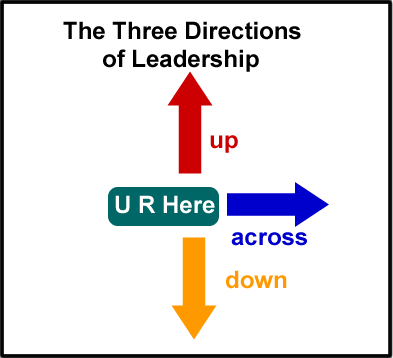
We may do this from a classic “leadership” position, such as boss or parent dealing with our employees or our children.I call this “leading down,” since the followers are assumed to have lower authority than the leader. “Leading across” means owning your individual power in a relationship with a socioeconomic equal, such as your spouse or partner, your friends, or business associates (my interactions with fellow coaches require all of us to “lead across”). Finally, “leading up” means exercising leadership power in situations where you are seen as a socioeconomic “inferior”—when you are the employee or the child, when the people around you seem to have more power or authority than you do.
I’ll be tackling each of the three directions of leadership in future posts. Right now, what I want you Teammates to know is this: No matter what your social or economic position, you can only fulfill your life’s mission by leading, and you can only lead by generating the energy of pure compassion.
I’m not just getting touchy-feely here; that last clause is empirically testable. If you’ve attended my speeches or workshops, I’ve probably made you try a move from aikido, a Japanese martial art that literally means “the way of harmonious energy” (the word “harmonious” can also be translated “compassionate”) It’s really simple. The instructions are below, and if you want to see me doing the exercise (with someone from Barnes & Noble.com), check out this link: http://www.youtube.com/watch?v=J0PYXhcw73M
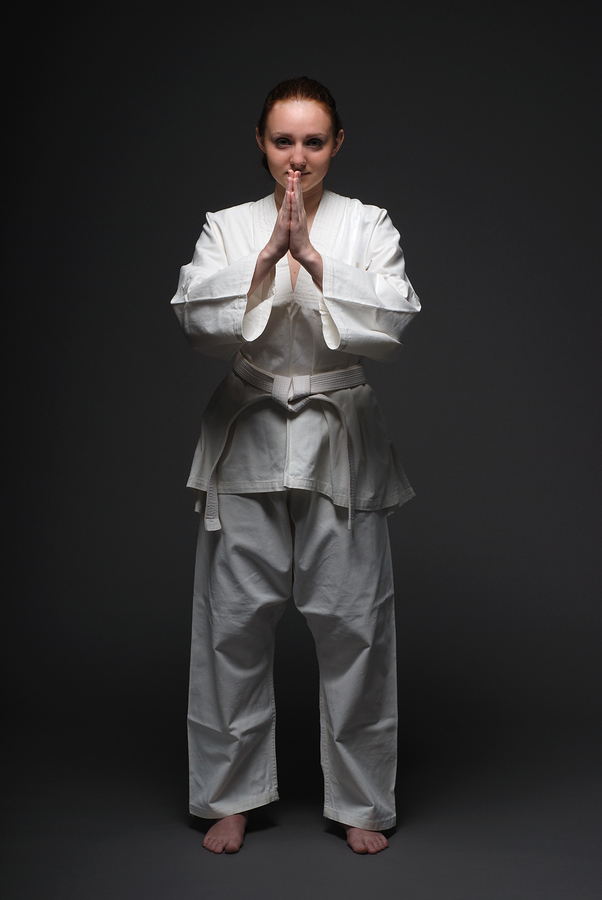
Step One: Pair off with a buddy, and have your buddy hold out his/her hands as if about to clap.
Step Two: Ask Buddy to keep hands apart as you try to push his/her hands together.Struggle against one another to test your relative muscle strength.
Step Three: Bring up a memory of being completely connected to another being whom you love with no ambivalence (a baby or pet works well for most people). Breathe deeply, and allow your adoration for your beloved fill your body and mind.
Step Four: Still breathing and communing, have Buddy hold his/her hands apart once more, just as s/he did the first time. Without thinking about Buddy’s hands at all, put your pams on the backs of his/her hands, and bring your hands together.
If you do this without holding back, you’ll find that the other person literally loses the strength, and the desire to resist you.I make audiences do this for themselves, rather than just watching it done, because it works like magic.It’s truly unbelievable to experience the difference in energy. Try switching roles with your buddy, so you can experience it both ways.
Of Mirrors and Magnets
I’m not sure exactly why this works, I only know that it does—over and over and over. Part of it may have to do with newly-discovered parts of the brain called “mirror neurons.”We now know that when we’re looking at another person (or any sentient being), part of our brains literally rearrange themselves to “mirror” that other being. In other words, when I’m looking at you and you’re looking at me, both our brains are physically changing configuration to make us more like one another.

This plays an obvious role in empathy, but it’s also a vein of gold in the quest for leadership. It means that when you deliberately hold your brain-state in the feeling of love and harmony, anyone looking at you is going to find his/her mirror neurons going to the configuration of love and harmony—which means they can’t or won’t resist you as much as they would if you were in a mental state of force and struggle. We all know people who think the whole world is out to get them, and being around these people—who hold onto a brain-state of struggle—actually makes most of us feel more combative and angry.
This means that you can lead by the clever maintenance of a dominant brain-state—but only if that brain state is compassionate. If we maintain brain-states of domination, we’ll create the will to dominate in other people’s brains.
Another factor that may be at work here is the electromagnetic field that’s generated by our nervous systems. Magnetometers can measure this field several feet away from us, and some evidence suggests that our brain waves and heart beats begin to synchronize with people around us.
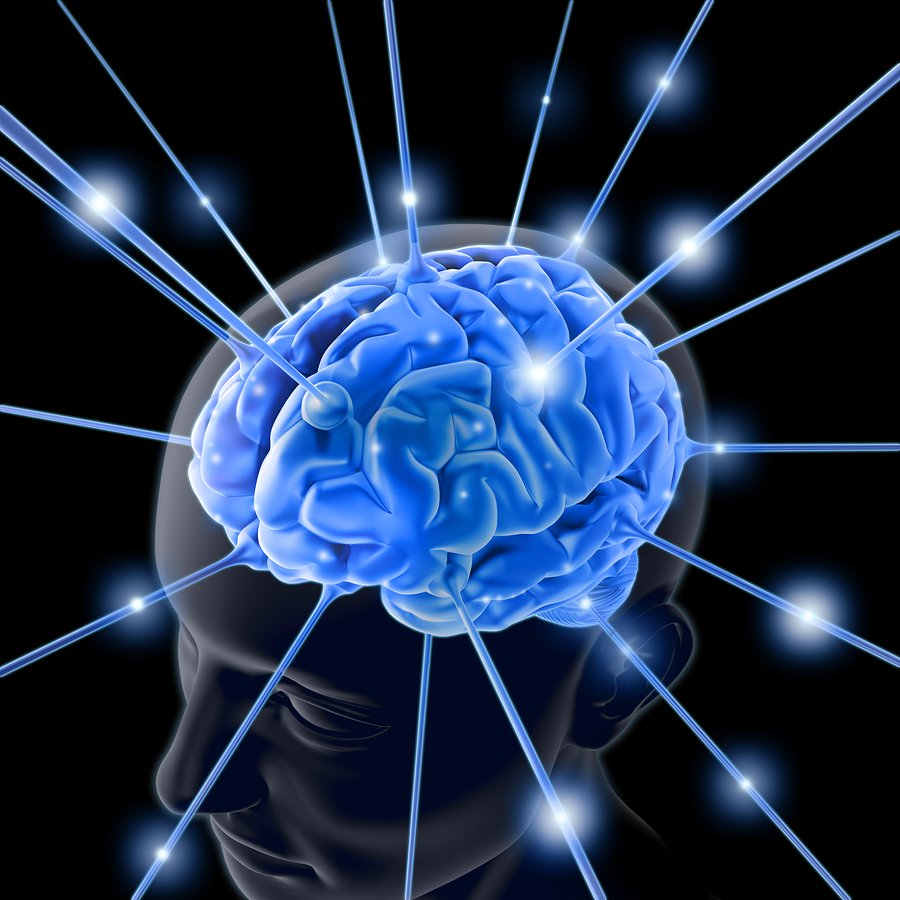
This might explain why some people “lose themselves” and get swept up in crowd mentality when surrounded by other people who share some strong emotion. I was at the “O You!” conference in San Francisco a few months ago, meeting with thousands of Oprah Magazine readers, when Oprah herself made a surprise appearance. The crowd became so agitated and desperate to see her that it started to feel strangely dangerous—at least it seemed so to me, to several other people I talked to later, and to one young woman who had something like a heart attack (I hope it was just a panic attack) right in front of me. Her heart was hammering its way right out of her chest, she said.I could feel it in my own chest, too; the manic pounding of a heart responding to a crowd that was nearly hysterical in its excitement.

The Mandela Magic
Of course, the audience at the O You! didn’t turn into a bloodthirsty agent of mass destruction. The people just wanted to see their leader, the Amazing O herself. When she walked on stage, she was able to generate so much compassion that the whole frenzied mob gradually calmed down. That, after all, is why they were there in the first place—Oprah is able to put herself in the compassion zone so completely that she’s like a walking power plant. The President of Hearst Magazines, Cathie Black, who is herself incredibly charismatic and intimidates the hell out of me, wrote in her book Basic Black that Oprah’s energy is almost overwhelming. There’s nothing negative about it—on the contrary, it’s extremely positive—but Oprah’s energy is so intense you can feel it surrounding her like a physical wall.
When I talk about the energy of compassion in South Africa, where crime is rampant and people in large cities are legitimately fearful most of the time, most people look at me skeptically.“Okay,” they’re thinking.“ I’m armed with compassion. The bad guys are armed with guns and crystal meth. Guess who’s gonna win that one.” Then I say two words: “Mandela magic.” Suddenly, the skeptical South Africans begin to look thoughtful, open, maybe even hopeful. They’ve felt the energy generated by Nelson Mandela, who led a whole country away from the brink of bloody catastrophe by the sheer force of his compassionate leadership.
I’ll talk more about this in my next post, but I want you to notice that Oprah and Mandela, two of the most influential people alive, began at the bottom of their culture’s unfair socioeconomic pyramids. An illegitimate, abandoned, abused African-American girl born in Mississippi in the 1950s, and a black African born into the most racist political system on earth—the odds of these two babies growing up to be world leaders were slim. Super-model skinny. Emaciated. Practically dead. Oprah and Mandela did not get power from any earthly institutions. They got it from within.
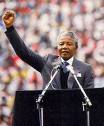
Accessing Your Inner Leader
There’s nothing stopping you from accessing the same power source that made Oprah and Mandela famous leaders—nothing, that is, outside your own skin. If you feel powerless, it’s because you’ve disconnected yourself from your leadership energy by plugging your brain into thoughts that disempower you. You’ve lost what psychologists call your “sense of self-efficacy.”In other words, you believe that for some reason, you can’t lead your own life; that your experience is shaped completely by external forces.
If you think you aren’t the leader of your life, you’re wrong. Except that, since you actually are the leader of your life, you’ll make yourself right. When you dictate “I am powerless!” your life will obediently comply with your policies.You’ll get stuck in one dead-end job, relationship, and lifestyle after another. You’ll be victimized and betrayed by those you see as powerful. You’ll try to fight them, and occasionally become the victor. But there’s a reason they say, “To the victor go the spoils.”Everything you take through victory over others means you’ve made them your victims, and that spoils everything. The flip side of victor is victim. The way to get out of the victim/victor paradigm is to lead yourself and others to a place of cooperative mutual advantage.
Again, this sounds simplistic, and we’ll get into a more detailed explanation in future posts, but here’s a quick example to show you what I mean. I was talking to a friend in Africa about the Team, and the new way of thinking that will be necessary if we are to save the world.I showed her the aikido trick I just described to you. At a certain point, she said, “Yes, there’s a time when even if a lion is looking at you, thinking, “I want to eat you,” the right kind of energy can give you power.”
“Exactly!” I said.“Because—“
“Because the lion will be afraid you’re going to eat him,” said my friend.
“No, that’s not it,” I said.“The lion decides not to eat you because lions are social predators who hunt in prides. If you can project leadership to the lion, he’ll decide that having you as part of his pride will be more advantageous in the long run than just eating you.”
“Hmmm…” said my friend, doubtfully.
“Mandela magic,” I said.
Her face cleared.“You’re right,” she said.“I get it.”
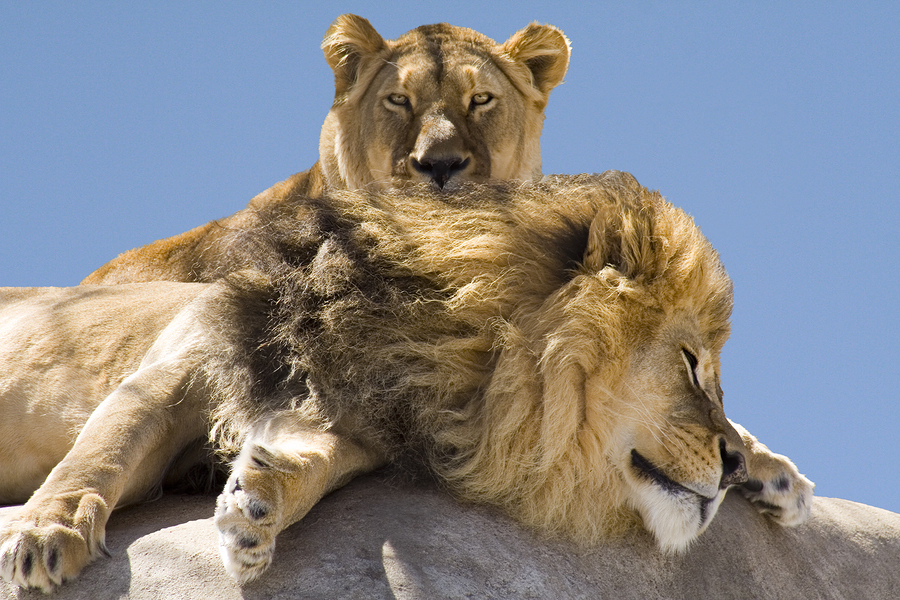
The leadership we must use in our everyday lives and social situations—everything from chatting with our spouses to waiting tables to running for office—is the energy of compassionate servant-leadership. The power of that position is truly unbelievable to those who don’t believe in supposedly fluffy concepts like the projection of personal energy.But the fact is, we’re all sources of leadership. Those of us on the Team have been given experiences that I believe were meant to teach us how to clear the lines in our minds that open us to the energy of compassion. The clearer we get, the happier we are—and the more the magic flows through us to others.
Homework for all Teammates
Before my next post, I hope you’ll try this little experiment.Get yourself into a mental state of compassion, relaxation, and peace by simply holding a memory of deep love in your mind, temporarily releasing all other thoughts.
- Go into a place that’s buzzing with the hustle-bustle energy of the holidays.
- Sit or stand still, breathe calmly, and become aware of the energy in this place. You’ll probably pick up a ton of anxiety and frustration from the crowd—these are people who are already too busy, trying to fit in a million holiday activities.
- Choose to detach from the crowd energy by continuing to breathe deeply (breathing patterns are very tightly connected to brain states) and going back to your positive memory.
- Silently ask this question:“How can I serve these people?” You may feel inclined to do something, but in the majority of cases, you’ll feel that the best thing you can do is become a calm, relaxed presence.
- Interact with someone (buy a cup of coffee or a holiday gift, say hello to a coworker, touch your baby, nod to the next person in line at the post office) while in a state of relaxed compassion. Make sure the compassion is directed at yourself, as well as others (otherwise, your’e not leading, you’re groveling).
- Feel what happens to the other person’s energy.
If this sounds weird, do it anyway. If you’ve never been aware that you “feel what happens to the other person’s energy,” you may be surprised that the effect is quite clear and observable. If you’re used to feeling others’ energy, but have never thought of yourself as a leader, the surprise will be how powerful you become when you hold the internal condition of compassion.

As the mission of the Team revs up (and it is revving, though I still don’t know exactly what it is) you need to step into your power as a leader. You’ll realize that it’s always your responsibility to hold that compassionate energy, to refrain from petulance and violence, to clean up the mess in your own head so that you can serve your people with clarity. The more you do this, the more you’ll find your mission in life presenting itself to you, along with ways to solve your personal problems, find nourishing relationships, make a living.In this tribe, we’re all chiefs—which means we all serve one another.The more we all develop our leadership power, the better served we’ll be.










27 comments
AT 10:12 AM
AT 10:20 AM
AT 4:22 PM
AT 9:00 AM
AT 9:18 AM
AT 11:48 AM
AT 4:43 PM
AT 10:49 PM
AT 11:28 PM
AT 9:35 PM
AT 7:42 PM
AT 8:10 AM
AT 12:24 AM
AT 8:18 AM
AT 2:47 PM
AT 8:27 AM
AT 3:05 PM
AT 12:19 PM
AT 1:37 PM
AT 5:43 PM
AT 6:30 PM
AT 4:53 AM
AT 10:53 AM
AT 2:29 AM
AT 11:15 AM
AT 10:19 AM
AT 6:53 AM